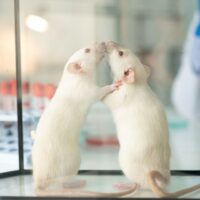Did you know that laboratory animals also suffer in psychological research? This causes a lot of stress among for monkeys, rats, dogs and other laboratory animals. And although we have learned a lot from psychological research with animals in the past, animal experiments do not always yield reliable results.
Fortunately, much behavioral psychological research is nowadays carried out directly with human subjects. But that is not always possible. In this article, you will discover how experimental animals are still used in psychological research and why innovative, animal-free methods are not only better for animals, but also for humans.
What is psychological research?
Psychological research includes everything related to human behavior. So not how our body works, but our mind. It concerns the basic functions of our brains, memory and logical reasoning, but also personality, mental health, and ideas about right and wrong. In many of these things, we obviously differ considerably from animals. And yet, laboratory animals are still used in psychological research.
Rats in the spotlight due to their intelligence
Although most people get the ick when they think of rats, these critters are often used in psychological research. The reason why researchers often choose rats is because these small rodents are extremely trainable. They are intelligent, enjoy human contact, and they like to play. But there are more animals that are used in psychological research, such as monkeys, cats, dogs and rabbits.

Why scientists use laboratory animals in psychological research
Scientists put forward various arguments to justify the use of laboratory animals in psychological research.
- Some scientists say that the brains of humans and animals are fundamentally similar because we have the same ancestors. Others say that the brains are so complex that animal brains are simply the best we have to learn more about the human brain.
- Another argument that scientists put forward for the use of animals in psychological research, is that the conditions of animals in a lab can be better kept constant than those of humans, who all have their own unique living environment and lifestyle. You cannot let ‘human test subjects’ live in a laboratory indefinitely.
- And this point brings us to the last argument: with animals, you can still conduct studies that you would never be allowed to do with humans today.
What psychological research on laboratory animals has brought us
Over the years, psychological research with laboratory animals has provided us with relevant insights into how we ourselves are psychologically put together. For example, researchers learned how hunger, thirst, and sexuality work in the brain. They gained insight into why we behave in a certain way and how we learn best. They discovered how medicines and drugs affect our brains.
This kind of insight helped, for example, in the development of treatments for mental and neurological disorders, but also in the effective organization of our education.

Increasingly more behavioral research on human test subjects
The fact that research with laboratory animals has brought us something at the end of the line, does not necessarily mean that we should continue with it. Fortunately, much research into the development of children and human behavior nowadays takes place directly on humans. And that makes sense: if we want to learn something about humans, we can better look at ourselves than at laboratory animals.
Still many laboratory animals in brain research
Unfortunately, we cannot simply replace all laboratory animals in psychological research with human test subjects. For example, studies that require brain surgeries cannot be conducted with people, nor can studies in which animals are ultimately killed so that researchers can dissect their brains.

An animal brain is not a human brain
Because the human brain is further developed in many areas than that of other animal species, the brain of another animal can never be a completely reliable model for a human brain. We must therefore continue to focus on innovative research methods that are not only better for animals – because they are no longer ‘needed’ – but also for people, because the results represent them better. We are not there yet, but we are further than you think.
